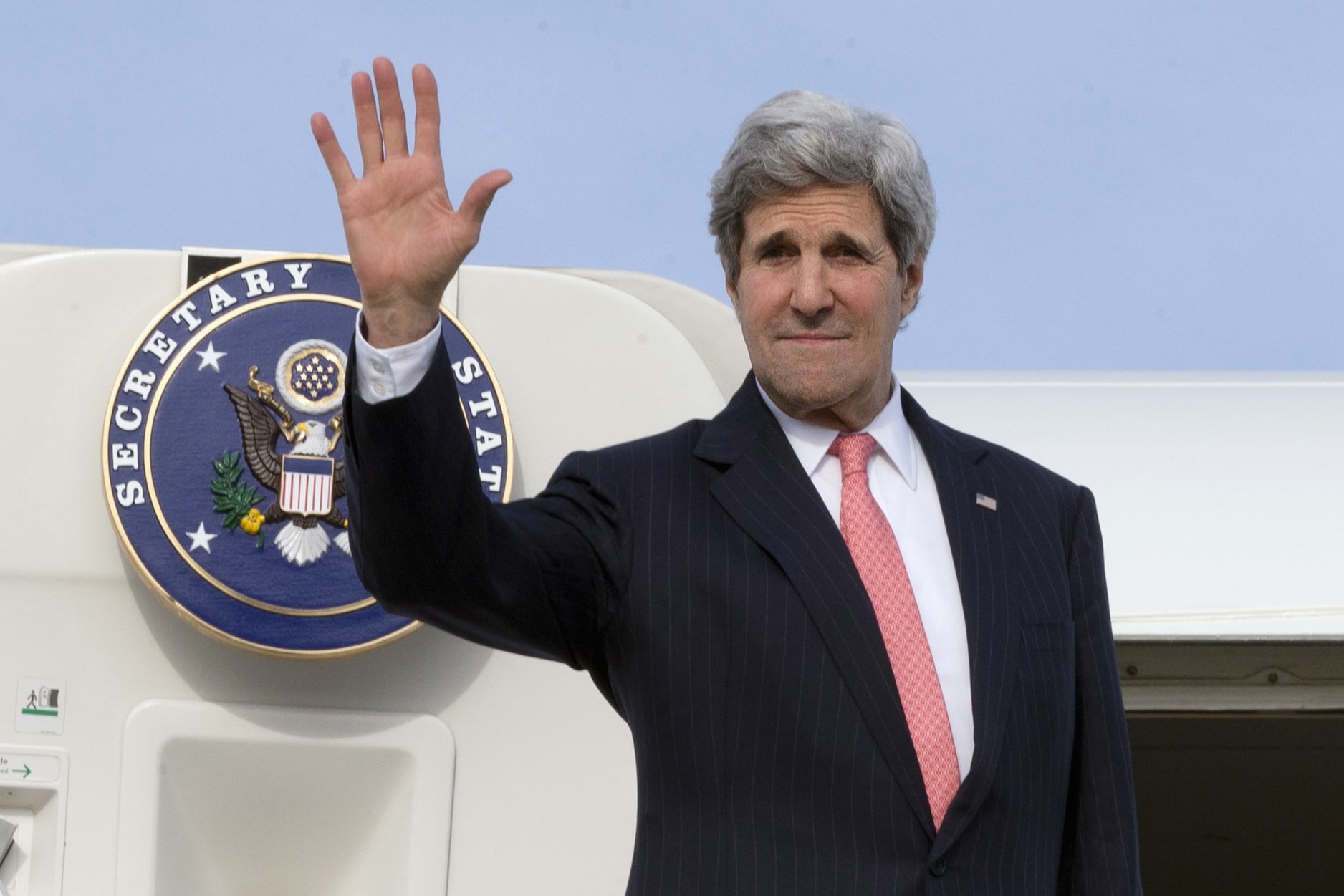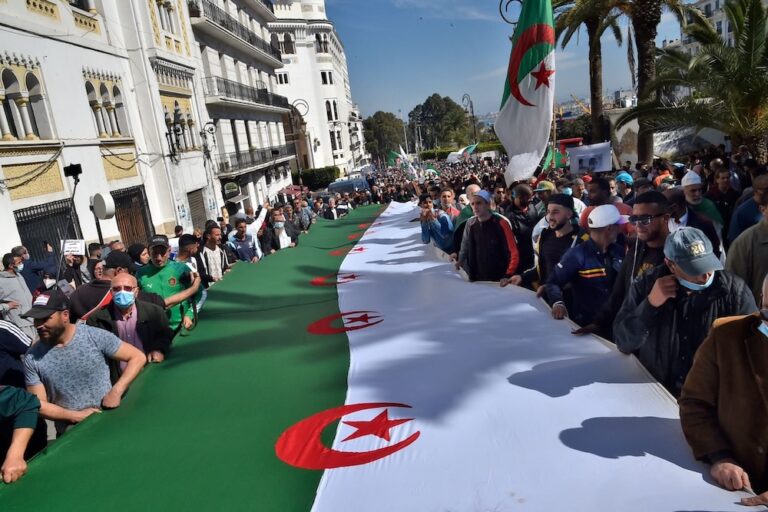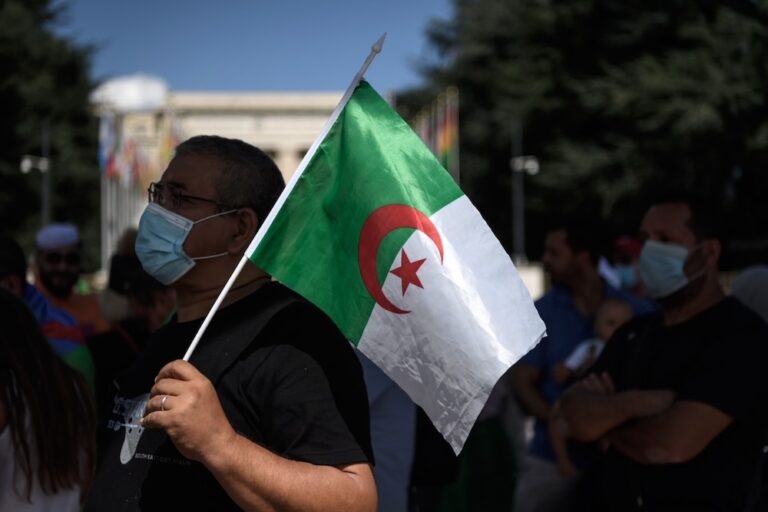Reporters Without Borders voiced its concerns about the state of freedom of information in Algeria in a letter to US Secretary of State John Kerry, who is to visit Rabat on 2 and 3 April as part of the strategic dialogue between the United States and Algeria.
Reporters Without Borders has voiced its concerns about freedom of information in Algeria in a letter today to US Secretary of State John Kerry, who is to visit Rabat on 02-03 April as part of the strategic dialogue between the United States and Algeria.
US Secretary of State John Kerry
Department of State
2401 E. Street NW
Washington DC 20037
USA
Paris, 1 April 2014
Dear Secretary of State Kerry,
As you are to make a two-day official visit to Algiers on 2-3 April for the second session in the strategic dialogue between the United States and Algeria, Reporters Without Borders would like to share with you its concerns about freedom of information in this country, ranked 121st out of 180 nations in our 2014 press freedom index.
We would also like to ask you to raise the crucial issue of freedom of information during your talks with your Algerian counterpart, Ramtane Lamamra.
In the run-up to the 17 April presidential elections, Reporters Without Borders has noted that journalists have been arrested during demonstrations in protest against President Abdelaziz Bouteflika’s decision to run for a fourth term.
At the same time, the Algerian authorities must, as a matter of the utmost urgency, overhaul the country’s media sector, in order to ensure real pluralism in both print and broadcast media. They must respect their constitutional and international obligations to respect fundamental freedoms, including freedom of information.
Presidential campaign tension
The police have repeatedly targeted journalists covering the protests against President Bouteflika’s candidacy for a fourth term, announced on 22 February. This harassment runs counter to the resolution adopted by the UN Human Rights Council on 28 March endorsing the importance of the role played by journalists in covering protests and stressing the need for states to give them the necessary protection.
For example, Echourouk TV journalist Zineb Benzita reported during a demonstration outside the Benyoucef-Benkhedda faculty in Algiers on 1 March: “The police arrested me although I was not participating in the demonstration. I was there as a reporter. I am now at the Cheraga police station with other detained journalists, activists and demonstrators.” Journalists were also detained along with demonstrators during the “Barakat” movement demonstration in Algiers on 6 March.
Meziane Abane, a journalist with Al-Watan Week-End and an active member of the “Barakat” movement, was arrested while in his hotel room in Batna, 500 km east of Algiers, on 17 March. He had been planning to do a report on the incidents that rocked the region after Bouteflika’s campaign manager, former prime minister Abdelmalek Sellal, mocked someone’s Chaoui (Berber) origins while being recorded by journalists.
After his arrest, Abane was taken to the local gendarmerie headquarters, where he was questioned about his supposed obligation to do military service, although he has been exempted. He was released the next day after being taken before a prosecutor.
The prosecution of Djamel Ghanem, a cartoonist with the daily La Voix de l’Oranie, also caused a stir. He was accused of “insulting the president” in an unsigned cartoon alluding to Bouteflika’s fourth term that was never published. When indicted on 20 November, he said the statement he had given to an investigating judge in Oran was extracted under duress.
On 11 March, an Oran court acquitted him of the charge, which carried a possible 18-month jail sentence and fine of 30,000 dinars (380 dollars). But the prosecutor’s office appealed against his acquittal a week later. Intimidated by the prosecutor’s determination and fearing for his and his family’s safety, Ghanem decided to leave Algeria and seek asylum in France.
Foreign correspondents have not been spared. In mid-March, the communication minister announced that all foreign reporters would have to notify the ministry in advance by email whenever they want to travel outside the Algiers region.
Fake pluralism
If you just looked at all the different newspapers displayed on newsstands on Didouche Street in Algiers, you might imagine that the print media were prospering and, with them, freedom of expression. Around 80 dailies, mainly Arabic-language ones, are available in the capital.
But the state of the media and free speech cannot be gauged by the number of newspapers. Many of them are published directly by businessmen with links to the government and intelligence services. According to a report by the UN special rapporteur on the promotion and protection of the right to freedom of opinion and expression, published on 12 June 2012, fewer than six newspapers are really independent in Algeria.
As for broadcasting, a new law that was adopted on 20 January is supposed to end the state monopoly that has existed since Algeria obtained independence. But its 113 articles, which aim to regulate and control the broadcast media, will not take effect until after the presidential election.
If it is implemented, privately-owned TV stations will be allowed to broadcast from Algeria for the first time. But they will have to be thematic in nature, and the length of their news programmes will be limited. The state will continue to have a monopoly of general news TV stations.
Many groups have voiced concern about the lack of independence of the Broadcasting Regulatory Authority (ARAV) that is to be created. Its nine members will be appointed by presidential decree and five of them will be chosen by the president himself. Its powers include the ability to restrict the length of the news programmes of the privately-owned stations.
As the ARAV has yet to be created, no privately-owned station has so far obtained approval. Foreign-owned TV stations must obtain accreditation in advance in order to be able to broadcast from Algeria. Some, such as Annahar TV and Echourouk TV, are already operating. The fact that all take a pro-government line suggests, at the very least, that this is a requirement for obtaining and retaining accreditation.
The case of Al-Atlas TV, a foreign-owned station that began operating in March 2013, is illustrative. Its premises were raided three times in two days last month. First, plainclothes gendarmes with a search warrant swooped on its headquarters at around 4 p.m. on 11 March. Then gendarmes with no warrant placed seals on the studios 25 km outside Algiers rented by Alpha Broadcast, a production company that supplied Al-Atlas TV with programming.
Accompanied by the state prosecutor, police officers returned to the TV station’s headquarters on the afternoon of the next day, seizing equipment and placing seals on the computer room. According to the Algérie Focus news website, the authorities then pressured the Jordanian TV satellite operator Noorsat to stop carrying the Al-Atlas TV signal. The signal was removed the next morning (13 March).
Al-Atlas TV’s CEO said the authorities targeted the station because of its critical coverage of the government, and President Bouteflika, in particular. The station also covered the protests by those opposed to a fourth Bouteflika term.
As a result, the election campaign is being covered by just the four state TV channels and foreign-owned TV stations that would seem to be in the government’s pay.
Continuing vigilance is needed as there is a danger that the new privately-owned TV stations will all end up being owned by powerful businessmen with close links to the political elite and the armed forces, in which case, ending the state’s monopoly of broadcasting would change little and would fail to boost media pluralism.
The print media, which have been pluralistic in principle since the 1990s, continue to suffer from monopolistic practices, especially as regards printing and distribution. Most are dependent on state-controlled printing houses (such as the Société d’Impression d’Alger) and distribution networks, and the state acts as it sees fit, deciding arbitrarily which publications will be printed and distributed.
Advertising is also used to pressure the media. Created in December 1967 and operational since April 1968, the National Publishing and Advertising Agency (ANEP) allocates advertising on behalf of state agencies and companies. State advertising is a major source of funding for the print media and strings are always attached to its renewal. Private sector advertising often comes from companies that support the ruling political elite and is above all channelled to newspapers that kowtow to the military and the Intelligence and Security Department (DRS).
So it is easy for the government to throttle critical newspapers economically. This has led to attempts by a number of publications to emancipate themselves from this tutelage. But the authorities can always fall back on another feared weapon – tax adjustments. This is a threat constantly hanging over independently-minded newspapers.
Need for real legislative reform
As the UN special rapporteur said in his report, “the current legal framework is still restrictive.” Despite the promises given by the authorities when Law 12-05, a new law on information, was being drafted, freedom of expression and the right to information are not sufficiently guaranteed.
As soon as Law 12-05 was adopted on 14 December 2011, it was slammed by opposition parties, journalists and human rights groups. Although article 2 says that “news reporting is a freely exercised activity,” it immediately restricts this activity by subjecting it to 12 catch-all conditions including respect for “national identity,” “economic interests” and “public order.” These restrictions also apply to the electronic media (article 71).
Many of the law’s provisions restrict freedom of information in a disproportionate manner. They include article 112 on the right of “any person or entity” to respond to articles “attacking national values and national interest,” article 123 on “causing offence to foreign heads of state” and article 119 on “publishing a document that violates the confidentiality of a judicial investigation.”
The law imposes many obstacles on publishing and the creation of media. Article 11 says that anyone is “free to publish a periodical” but it nonetheless stipulates that publications require official approval. Too many restrictions are also placed on foreign publications, which are subject to the communication ministry’s control (article 22).
As the special rapporteur’s report says, “there should be no official or de facto mechanisms of authorization beyond notification to state institutions.” A number of labour unions and NGOs filed a notification of their intent to publish a newspaper under article 4 of Law 90-07, but they were unable to proceed because the authorities refuse to issue them with the required receipt. Algeria’s authorities should follow international standards on launching new publications. Prior restrictions are unacceptable.
While the creation of a print media regulatory authority is positive in principle, questions persist about its composition, independence and extent of its powers. According to article 50, three of its members, including the chair, are appointed directly by Algeria’s president, two are appointed by the national assembly speaker, and two are appointed by the speaker of the national council (senate). The other seven members are elected by absolute majority from among professional journalists with at least 15 years of experience. Like the special rapporteur, Reporters Without Borders fears it will end up restricting media freedom even more.
Continuing danger of imprisonment
Law 11-14 of 2 August 2011 decriminalized defamation of government officials by amending articles 144 (b) and 146 of the criminal code. Similarly, Law 12-05 on information abolished prison sentences for media offences. This should have ended the threat to journalists posed by articles 144 (b), 146 and 77 to 99 of the criminal code, but the fines are disproportionate and articles 296 and 298 of the criminal code maintain prison sentences for defaming individuals.
While judicial proceedings against journalists or media may be slowed down or even “forgotten,” the threat of a judicial decision subsequently emerging constitutes a threat that forces journalists to censor themselves.
I thank you in advance, Secretary Kerry, for the attention you give to this letter.
Sincerely,
Christophe Deloire Reporters Without Borders secretary-general



